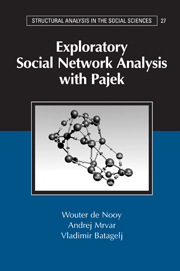Book contents
- Frontmatter
- Contents
- List of Illustrations
- List of Tables
- Preface
- Part I Fundamentals
- Part II Cohesion
- Part III Brokerage
- 6 Center and Periphery
- 7 Brokers and Bridges
- 8 Diffusion
- Part IV Ranking
- Part V Roles
- Appendix 1 Getting Started with Pajek
- Appendix 2 Exporting Visualizations
- Appendix 3 Shortcut Key Combinations
- Glossary
- Index of Pajek Commands
- Subject Index
8 - Diffusion
Published online by Cambridge University Press: 05 June 2012
- Frontmatter
- Contents
- List of Illustrations
- List of Tables
- Preface
- Part I Fundamentals
- Part II Cohesion
- Part III Brokerage
- 6 Center and Periphery
- 7 Brokers and Bridges
- 8 Diffusion
- Part IV Ranking
- Part V Roles
- Appendix 1 Getting Started with Pajek
- Appendix 2 Exporting Visualizations
- Appendix 3 Shortcut Key Combinations
- Glossary
- Index of Pajek Commands
- Subject Index
Summary
Diffusion is an important social process. Administrators are interested in the diffusion of information and opinions manufacturers seek the adoption of new techniques and products, and all of us have a vivid interest in not acquiring contagious diseases. Diffusion processes are being studied in the communication sciences, social psychology and sociology, public administration, marketing, and epidemiology.
In this chapter, we present diffusion processes from a network point of view. Diffusion is a special case of brokerage, namely brokerage with a time dimension. Something – a disease, product, opinion, or attitude – is handed over from one person to another in the course of time. We assume that social relations are instrumental to the diffusion process: they are channels of social contagion and persuasion.
If personal contacts are important, then the structure of personal ties is relevant to the diffusion process and not just the personal characteristics that make one person more open to innovations than another. We investigate the relation between structural positions of actors and the moment at which they adopt an innovation.
Example
Educational innovations have received a lot of attention in the tradition of diffusion research. Our example is a well-known study into the diffusion of a new mathematics method in the 1950s. This innovation was instigated by top mathematicians and sponsored by the National Science Foundation of the United States as well as the U.S. Department of Education.
- Type
- Chapter
- Information
- Exploratory Social Network Analysis with Pajek , pp. 161 - 184Publisher: Cambridge University PressPrint publication year: 2005



